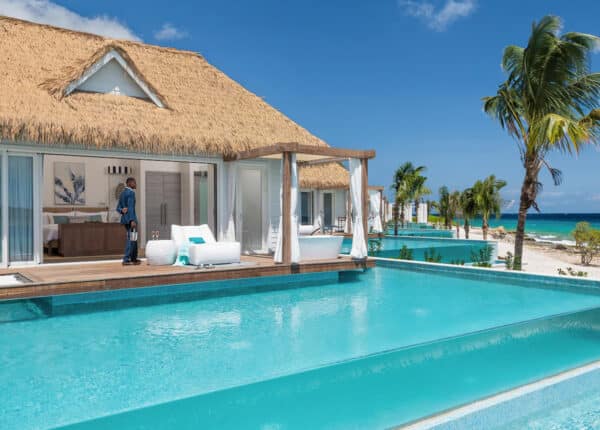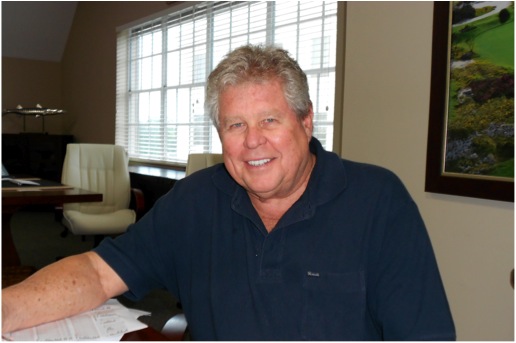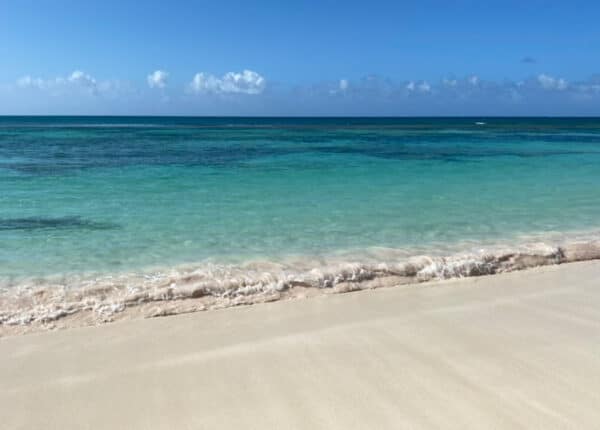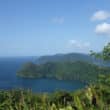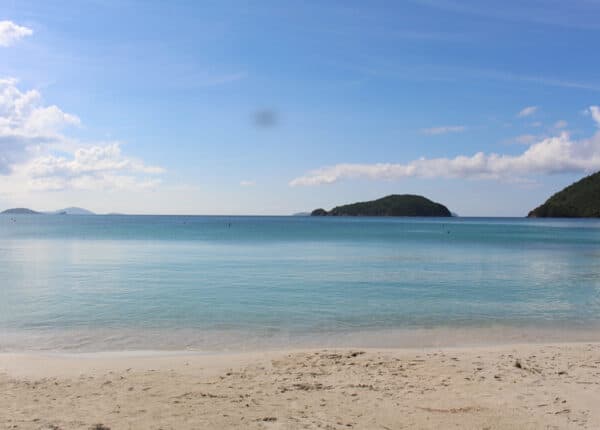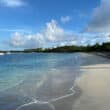Interview with Gordon “Butch” Stewart
Above: Gordon “Butch” Stewart (Photo: CJ)
By Alexander Britell
Gordon “Butch” Stewart is one of Jamaica’s leading businessmen and a pioneer in the hospitality industry. Stewart is the chairman or owner of more than a dozen companies, including Sandals, Beaches and the Jamaica Observer newspaper. One of Jamaica’s influential voices, Stewart does not hold back on issues facing his country and the region, including a significant one, for him: taxation. Caribbean Journal talked to Stewart at his satellite office in Nassau about Caribbean tourism, Prime Minister Bruce Golding’s decision to step down and an “overtaxed” Jamaica.
How much was Caribbean tourism hurt by the downturn?
That’s a tough question. I don’t think there’s any regional numbers out there of any significance. I think it’s fair to say that it has hurt the region a lot. The general marketing of the region – when you get into a situation like this – is not strong enough to defend [itself], and the consequence of it is that you start losing airlift. [Caribbean economies] also suffer from airlift becoming more expensive, which compounds the problem. But I think if you take a big look and try to attach a cost to it, I think you can easily put a figure of 10 percent of whatever that value is – whether it’s in people – you might not have lost 10 percent of arrivals – but when you look at the rates you get because of the depression of the business, I think 10 percent would probably be a reasonable figure.
What does the region have to do to improve the tourism sector?
I think, generally, the region has improved a lot, when it comes to the whole tourism sector. I think a lot of governments want the benefits of tourism, but their approach is more that of a milch cow – they want the cow, but they don’t want to take the necessary care of the cow, and consequently the don’t give the cow the proper vitamins, and they get less of the cow in the long run. And the favourite thing for governments in the region is, they get under pressure, so the reaction is to tax the industry. And by taxing the industry, you end up getting less, because the industry is no different to a horse that races. The more weight you put on it, the less likely that it’s going to come in a good time and win. The governments of the region – some of them better than others, no question –their line of least resistance, the easiest way out is to tax, and it’s the worst part of it. And it happens in a lot of different ways. They want to tax the imports, whether it be food, and they want to raise the taxes on that, they want to tax the rooms. They want to tax construction, they want to put in what I consider stealth taxes, where some of them want to charge a beach tax. They want to introduce all sorts of things that, when you add them all up, the departure taxes, the airport taxes, through taxes, the industry is now taxed for everything. Soon, it’s going to be the air that you breathe. And if it’s going to be successful, you have to go back to the basics. It’s not that the industry can’t take some taxes – but unless [tourism] is treated as an export, you’re never going to get the development. You’re never going to get the growth, you’re never going to get to your first base properly. Everybody thinks that the white sand beach that they have is the only beach in the world, and people must come. They don’t realize the great difficulty in bringing the folks. So the tax is crippling the region as a whole.
We talked to [Jamaican Tourism Minister] Ed Bartlett earlier this summer about what Jamaica is trying to do in targeting markets like Latin America. How much can these markets can do for regional tourism?
Those are new and fresh markets. They’re markets that generally, their economies are doing better than the traditional economies. They’re excellent [markets].
Can China have an impact?
No question – it can have a big impact. Airlift is the first strategic thing. We’re a long way away from being positioned to get any meaningful numbers of people, number one. Number two, you have to look at the habits of those countries – when they get annual leave, how long it is – is it only a week? Does it take more than a day coming and more than a day going, so they’re already down to a net five nights of holiday? And how much of that population, even though it’s vast, can afford better quality? So what is the product that you’re going to put there. But China is one of the fastest, brand new markets [for the region].
Obviously Prime Minister Bruce Golding’s decision to step down has been major news of late. What will that mean for the country?
I think Prime Minister Golding set an example for the Caribbean – and it’s a quality example. It’s something that I think politicians around the region [should notice]. When you get to a point where there’s a stigma attached to you, whether fair or unfair, then you’re in the way of progress for the country and the political movement. And I think he sacrificed himself so that a better opportunity could happen for the country.
Do you have an opinion on Andrew Holness?
I think it’s an excellent choice. I also think that we have not seen anything like this for a long time, where the population as a whole just favours Andrew Holness. And if you go down the road, and see 20 people, 18 of them want Andrew. It’s an incredible opportunity for the ruling party.
How much has Jamaican tourism changed?
The tourism sector in Jamaica has grown a lot. And Jamaica is a tremendous and beautiful destination – it’s my country. It is easily the prettiest destination you can find. And it’s got a nice mix of mountains, sea rivers, vegetation, and a great, great people. All of the different islands have their own strengths. The Bahamas has, I find, incredible strengths. Jamaica is one of them that runs the risk of overtaxing the industry. And at this stage, it is overtaxed. And the costs have risen so quickly that the return on investment, unless special deals are cut or something, allows the viability to be difficult.
What kinds of projects are you working on right now?
We have a ton of projects we’re working on. We’re nonstop with our refurbishing, upgrading. We’ve changed our product over the last seven years, to where we can attach the words “luxury included,” ultra luxury and all-inclusive. We actually make the statement that nobody can challenge, that we have more quality inclusions than any other resorts in the world. It’s factual – nobody can challenge it. And that’s the way it is. Before you’re building big buildings and hotels, our job is to get the quality and the operations that you have. Right here in Nassau, we just started it – we have a block of rooms, the order of 144, which houses the lobby, the main bar and the piano bar, and we’re taking that out of service and improving the rooms. We’ll end up having brand spanking-new rooms that, by the end of February, will do great justice to the destination, I think.
Let’s return to the taxation issue.
The region is running around trying to get new investment. You mention Ed Bartlett’s name – I think he’s done a great job as minister. And he has done a great job of selling his country and putting a good face on it. I’ve also had discussions with him in regard to the operational side of the industry – it’s one thing to sell, but it’s no good if you get a 50 percent increase in traffic but your costs are going through the ceiling. New investment is going to assess what your costs are like, and Jamaican has been one of those [countries] that have applied additional duties and done things that drive up your cost. There’s a stiff IMF programme right now. I think we’ve gotten into a trap, and I don’t think the IMF themselves understand the need for when you want to refurbish a hotel. The typical thing is that you get 15 years tax free – a lot of that is operational items, not food and other important areas. So they figure that a hotel will be on its feet by the time that happens. But the trouble is you’re dealing in a more and more competitive world. In the 1990s, everybody that had become rich or wealthy wanted to build a hotel as an example of something to do. Not only that, but people in the business expanded a lot. So your room costs went up dramatically at time that there’s pressure on the bodies that keep your beds warm, so that only adds to the pressure. Unnecessary taxation puts a lot of damages on your ability to produce a better product. Because it forces some of the products to nickel and dime, and so we’re seeing a difficult market, a tough market.
